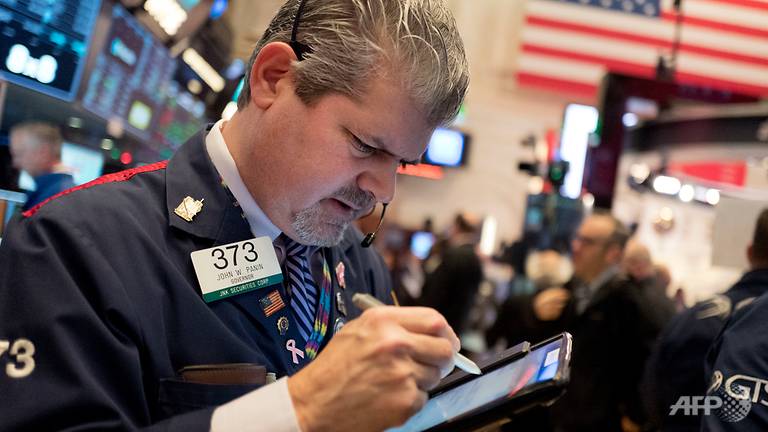Dow hits 25,000 points for first time on US hiring data
 |
| Traders work at the New York Stock Exchange. (Photo: AFP/Mark Lennihan) |
US stocks opened 2018 in full-throttle bull market mode, bidding stocks up and continuing the succession of records seen last year, especially following the massive tax cut that President Donald Trump signed into law just before Christmas.
The blue-chip index hit the landmark within minutes of the opening bell and pushed higher from there before leveling off. Near 1645 GMT, the Dow Jones Industrial Average stood at 25,045.86 up 0.5 per cent from Wednesday's close.
The broad-based S&P 500 rose 0.4 per cent to 2,722.80, while the tech-rich Nasdaq Composite Index advanced 0.2 per cent to 7,076.54, both adding to Wednesday's records.
Adding to the optimism about tax reform was the better-than-expected economic data, after payroll firm ADP reported that private employers added 250,000 jobs last month, well above the 190,000 that had been expected by analysts.
The data come ahead of the more closely scrutinized government jobs report on Friday.
Analysts said strong international economic data also reinforced confidence in a strengthening global market.
"Yesterday's PMIs came from all over the world, and they are up everywhere," said Maris Ogg, a founding principal at Tower Bridge Advisors. "The path of least resistance is still up."
MORE VOLATILITY AHEAD?
The Dow's push above 25,000 is another landmark for the index amid a multi-year bull market since the depths of the Great Recession that followed the 2008 financial crisis.
The latest push higher comes as US unemployment and consumer confidence linger at or near multi-year high levels, and as US tax cuts have led analysts to boost corporate earnings estimates.
Market watchers vary on where they see stocks going from here, with some forecasters expecting the positive momentum to continue throughout the year and others anticipating greater volatility.
Key hurdles that could derail the surge in equities include the possibility of more aggressive than expected tightening of monetary policy by the Federal Reserve and other global central banks, as well as fears the Trump administration's tough posture with international commercial parties could lead to a trade war.
But Ogg senses greater confidence among clients as they grow accustomed to the Trump presidency.
"Last year at this time, I was calls from clients saying 'You've got to get me out of this. I am really nervous he'll take us to war,'" she said. "I am getting less of that."
Still, stock valuations relative to earnings, although not at all-time peaks, are on the "upper range" of normal levels, she said.
CFRA Research's chief investment officer Sam Stovall expects greater volatility this year compared with the placid 2017.
Earlier this week he projected the S&P 500 would end the year at 2,800, which implies a large portion of the year's gains have already happened.
"I feel like a dieter with a calorie allotment who has already gone through half or three-quarters of that by 9 am," Stovall quipped on CNBC on Thursday.
RETAIL SHARES SLUMP
Major gainers in the blue-chip index on Thursday included banks JPMorgan Chase and Goldman Sachs and credit card companies American Express and Visa, two sectors expected to benefit from higher interest rates. All rose at least one per cent.
Other Dow leaders included IBM and General Electric, companies that have underperformed the broader market in recent years.
They were offset somewhat by Intel, which slumped 3.1 per cent amid questions over a defect in computer chips that could render sensitive data vulnerable to hackers.
Retailers also were under pressure following holiday performance updates by department stores showing sales improved, but perhaps not as much as hoped.
Macy's, which rose nearly 35 per cent in the last two months of 2017, dropped 5.1 per cent after reporting that comparable sales rose 1.1 per cent in the key November-December period.
JC Penney, which also reported higher holiday sales, saw its share price lose 5.1 per cent, while Target fell 2.6 per cent and Best Buy 2.9 per cent.
Tesla Motors dipped 0.1 per cent after again pushing back its time-frame for ramping up output on the closely-watched Model 3 vehicle.
The electric carmaker said it now expects to hit a production level of 5,000 a week by the end of the second quarter instead of at the end of the first quarter.
What the stars mean:
★ Poor ★ ★ Promising ★★★ Good ★★★★ Very good ★★★★★ Exceptional
Latest News
More News
- Cashless payments hit 28 times GDP in 2025 (February 04, 2026 | 18:09)
- SSIAM and DBJ launch Japan Vietnam Capital Fund (February 04, 2026 | 15:57)
- Banks target stronger profits, credit growth in 2026 (February 04, 2026 | 15:43)
- Vietnam on path to investment-grade rating (February 03, 2026 | 13:07)
- Consumer finance sector posts sharp profit growth (February 03, 2026 | 13:05)
- Insurance market building the next chapter of protection (February 02, 2026 | 11:16)
- NAB Innovation Centre underscores Vietnam’s appeal for tech investment (January 30, 2026 | 11:16)
- Vietnam strengthens public debt management with World Bank and IMF (January 30, 2026 | 11:00)
- Corporate bond market poised for stronger growth cycle (January 28, 2026 | 17:13)
- Vietnam's IPO market on recovery trajectory (January 28, 2026 | 17:04)
















 Mobile Version
Mobile Version